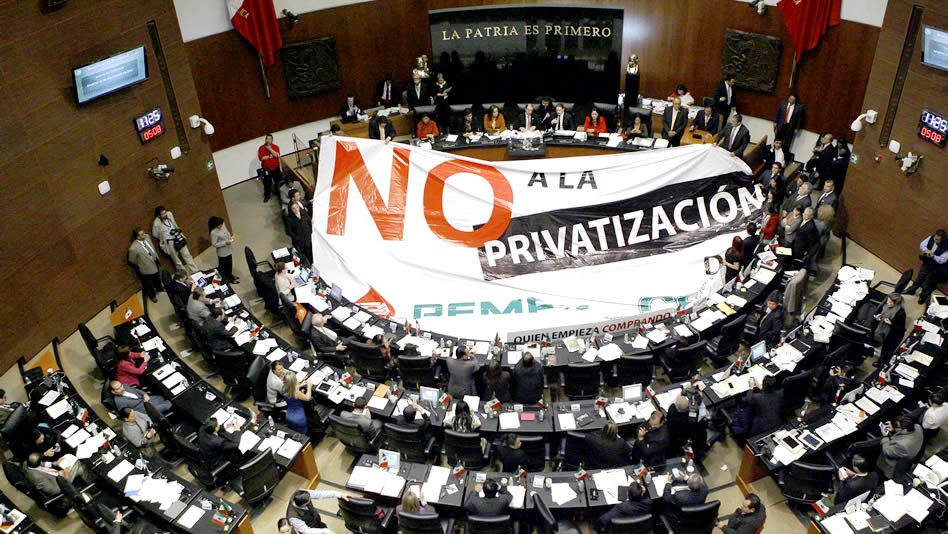EspañolAfter several days of intense negotiations, the Mexican Senate today approved the partial reform of the nation’s energy sector — specifically, Articles 25, 27, and 28 of the Constitution. With 95 votes in favor and 28 against, the energy sector will open to private investment, both local and international.
Since 1938 and the mass expropriation of foreign assets in the oil industry, private participation in the energy sector has been a controversial topic, facing great resistance. In 2008, the government of Felipe Calderón promoted an energy reform that slightly changed the legislation but didn’t manage to open it up to private investment.
Now, with President Enrique Peña Nieto’s role, the participation of private companies is possible. He has offered this reform as an attempt to recover the growth of the sector and make it investment-friendly. That will mean several important changes in its policy framework.
Private companies, both local and international, will be able to participate in the extraction process of crude and natural gas. Mexican Oil (Pemex) — a public oil company — will have 60 days, once the law goes into force, to prove that it has the financial and technical capacity to undertake, in an efficient and competitive way, the exploration and exploitation of hydrocarbons. Otherwise, it will lose its rights to operate in the fields previously assigned, and private companies will be able to step in.
Before this reform, Pemex was the only one that could process natural gas and process it into basic petrochemical products; now other companies can join it. This includes the creation of a National Center for the Control of Natural Gas as a decentralized public entity, in charge of the national duct system for the transportation and storage of natural gas.

Types of Contract
Companies will participate in four partnership arrangements: service contracts, shared-profit, shared production, and licensed agreements. Despite these changes, it’s still forbidden for Pemex to grant concessions for independent extraction. Similarly, the policy change prohibits Pemex from using the so-called “round zero” tender process, in which it has first access, to choose projects based on cronyism rather than competitive performance. Regarding compensation and profit-sharing for the international companies, in exchange for their extraction activities, the state will be able to pay contracts in cash from the sale of hydrocarbons, or in barrels of oil or natural gas.
Creation of the Oil Fund
The creation of the Mexican “Oil Fund for Stabilization and Development,” a technical commission to invest state oil revenues, will be under the control of Mexico’s central bank (Banxico) as the main fiduciary. The fund’s legal status will begin in 2014, and it will start operating proper in 2015. The structure will have at its head a Technical Committee, including representatives of the Secretary of Energy, Banxico, and Mexico’s Internal Revenue Service, alongside two independent members.
This fund is set to finance energy projects, public pension plans, scholarships, regional development in the industry sector, and investments in projects in science and technology for renewable energies. These contributions will only be made once the fund’s long-term value reaches 3 percent of Mexico’s annual economic activity. If it reaches 10 percent, the extra income will go to the Internal Revenue Service.
Workers Union Loses Place in Pemex Administrative Council
The Union of Oil Workers of Mexico (SRPRM) will lose its decision-making power in the Pemex Administrative Council, where until now they had five member representatives and one third of the 15 members. This particular topic caused tension between the Institutional Revolutionary Party (PRI) and the National Action Party (PAN); however, they eventually agreed to remove the union from the company’s government body, as a way to make it more productive and efficient.
Pemex and CFE to Be Competitive Companies
This reform aims to transform Pemex and the Federal Commission on Electricity (CFE), from being “decentralized bodies” to “productive companies for the State.” The state will set the actions to be taken, in its management and functioning, in order to guarantee their efficiency and productivity. Additionally, article 27 of this bill states that both companies will be able to perform contracts with individuals in a profit-seeking manner.
Greater Autonomy for Regulatory Bodies
With this reform, the Regulating Commission of Energy (CRE) and the National Commission of Hydrocarbons (CNH) will now be decentralized and distinct legal entities. The CNH will support the Secretary of Energy, in deciding which fields should be tendered, launching the tender, and deciding the winners. The CRE will then grant the permissions for distribution, regulation, and storage of the oil and natural gas.
Who Supports this Reform?
The PRI, PAN, and Green Ecologist Party of Mexico (PVEM) have been the political groups that have pushed this reform in the oil sector. In doing so, their initiative breaks from traditional paradigms and political taboos in Mexico.
On the other hand, the Democratic Revolution Party (PRD) and Citizen Movement (MC) have voted against this project. PRD announced their opposition to all the articles, including the 21 temporary ones of the more than 300-page legislation. They protested defiantly, albeit unsuccessfully, right inside the Senate with banners that said “No to Pemex and CFE privatization.”

Additionally, PRD initiated an educational campaign against this reform, calling for protests. They made known that they will seek to revoke this law through a referendum. The founder of the party, Cuauhtémoc Cárdenas — son of the former President Lázaro Cárdenas, who was responsible for the oil expropriation in 1938 — said: “This reform opens up the possibility for any oil wealth of the country . . . to be manipulated by the interests of big oil corporations.”
Moreover, the National Regeneration Movement (MORENA) — founded by the hardline socialist and former presidential candidate Manuel López Obrador — also opposed this initiative and protested outside the Senate for six days in a row.
The impact this reform entails, not only in Mexico’s energy sector but in its wider economy, remains hotly debated. Peña Nieto still has to face many challenges with implementation; however, with the Senate’s approval, the current president has ventured further in this realm than any of his predecessors of the past few decades.
 Versión Español
Versión Español












